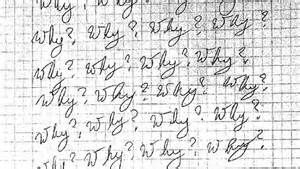Psychosis
James Holmes' Notebook
Contents of James Holmes' notebook are released. Will they prove insanity?
Posted June 1, 2015
James Holmes' notebook, titled “Of Life”, which houses the Aurora cinema shooter's writings and drawings, was recently submitted into evidence by the prosecution during his trial. In the notebook, Holmes outlines thoughts he’s had since a childhood. An "obsession to kill", his "lifelong hatred of mankind" as well as his "broken mind". Drawings include stick victims, discussion on various methods of killing large numbers of people, detailed theater layouts and lists of pros and cons for different theaters.
Holmes had mailed "Of Life" to Dr. Lynne Fenton, a psychiatrist and professor who had previously treated Holmes. After the massacre, the package was found, still undelivered, in the University of Colorado Anschutz's mail room. Prosecutors say the notebook proves Holmes knew what he was doing because of the meticulous planning and plotting, while the defense is sure to say the ramblings are that of an insane individual.

The 29-page rant revealed that Holmes considered a massacre in an airport, but he didn’t want others to think he was a terrorist. He considered biological warfare, but eventually chose a "mass murder/spree." "Terrorism isn't the message" he wrote, "the message is, there is no message." He added the cause of the cinema mass killing was "my state of mind for the past 15 years."
As I discuss in James Holmes: A Psychiatric Analysis, just because someone is very intelligent doesn't mean they can't suffer from serious mental illness. In his notebook, Holmes questions "What is the meaning of life? What is the meaning of death?" He also wrote "Embrace the hatred”, and that his failures in graduate school may have been a catalyst for the killings, but was not the cause. "Most fools will mistake correlation for causation." You can see the notebook writings here, including eight pages of "Why", written over and over and over again.
After reviewing the notebook, it’s clear that Holmes has episodes of illogical thinking and rambling thoughts, but is this enough to prove psychosis? No, not without an interview. But, it is enough to suspect a serious mental health condition in conjunction with the fact that he was seeing a psychiatrist. AND, most importantly, if I saw this notebook and was told that my next patient had written it, the first thing I would suspect before the interview would be some type of psychosis.

Historically, 19 shooters from 61 American mass shootings were arrested -- all the others were either killed or committed suicide. Of those 19, only four (including Holmes) pleaded guilty. Cases where attorneys attempt a not guilty by reason of insanity (NGRI) defense are rare -- less than 1 percent overall. Success rates for those NGRI cases is 26%. So, statistically, the odds of Holmes' insanity defense prevailing are about one in four.
As passages from the brown notebook were read, the jury was able to hear Holmes' detailed plans and see the diagrams, down to the number and the location of the theater exits. A check mark was next to "mass murder/spree", with an added "maximum casualties" scribbled nearby, lending evidence that Holmes knew exactly what he was doing well in advance. Or did he?
The truth is, there are many angry people in the world, some psychotic, some not. Many of them think about, talk about, write down and even plan violence and murder. However, few of them actually act out and commit the crimes they fantasize about. So the question is, does his meticulous planning prove that he was fully functional and logical? The prosecution will argue that the notebook proves he knew exactly what he was doing and therefore is sane and competent. I’m not so sure, because even if you believe that he was not psychotic during the planning stage, it doesn’t disprove that a psychotic episode occurred around the time of the shooting, which was the trigger to this horrific attack.
James Holmes' actions after his arrest lend credence to a psychotic break. Hours after his arrest, he sat in police headquarters, where his eyes bulged and his eyebrows twitched. He spit at the officers repeatedly, so they strapped him with a face guard. He said over and over that he was Batman and the Joker, and when evidence bags were placed on his hands to preserve gunpowder residue, he acted as if the bags were puppets. Was Holmes really insane at the time, or was he faking?
Stay tuned. I’ll follow up soon as more evidence becomes available.




